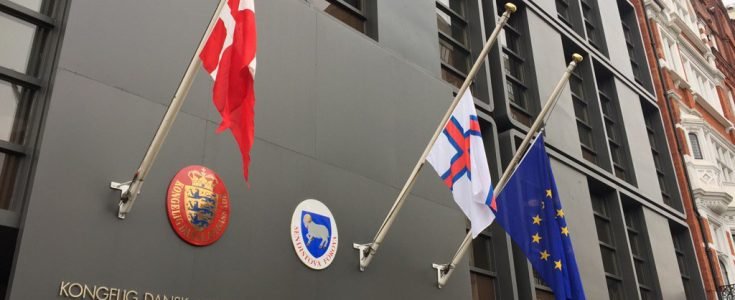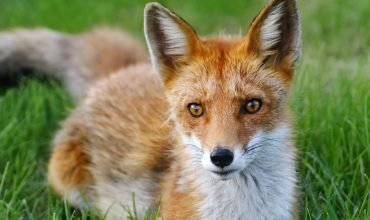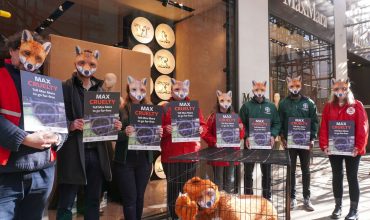Here is the text of our letter to the Danish Embassy. We are calling on the government of Denmark to permanently ban fur factory farming and on the Embassy in London to cease hosting the fur trade propaganda events, which it did earlier in 2020. Fur farming is a disaster for animal welfare and a risk to human health.
- Please add your name at the bottom of the page

As you will be aware, Danish fur farms have been hit by serious outbreaks of coronavirus among the factory farmed mink population. We are writing to ask the Danish government to bring forward legislation to permanently outlaw the farming of animals for their fur on the grounds of animal welfare and risk to human health. In addition, we strongly urge the Danish Embassy in London, which hosted a fur trade event early in 2020, to review all future connections with the fur industry.
Denmark’s fur industry has caused considerable concern around the world in recent weeks. The European Centre for Disease Prevention and Control said on Thursday, 12 November, that the virus mutation found in Danish mink “could potentially affect the level of overall vaccine effectiveness of vaccines under development.”
This situation is so serious that the Netherlands will close all mink farms by early 2021. Mink on fur farms are kept in intensive, factory farm conditions where disease and abnormal behaviour is common. By keeping caged animals in cramped conditions, animal welfare on fur farms is extremely low, as explained in the 2015 scientific report, The Case Against Fur Factory Farming.
In recent months alone, footage from France and Poland revealed shocking examples of animal suffering, including mink with physical injuries kept in appalling conditions and displaying stereotypical behaviour, all of which is deeply distressing to view. The animals were housed in small cages without access to water to bathe or swim, or the ability to engage in other natural behaviour. Some of them had injured eyes, missing teeth, missing tails, paralysed and necrotic legs, and skin diseases. The farming systems used in Denmark is the same as France and Poland.
Indeed, the comprehensive scientific report from 2015, The Case Against Fur Factory Farming, explored the serious welfare concerns inherent in mink and fox factory farming. The report concluded that a fur farming ban is the only viable solution to these concerns.
Further to this, the farming of mink for fur should be prohibited in accordance with European Council Directive 98/58/EC: “No animal shall be kept for farming purposes unless it can reasonably be expected, on the basis of its genotype or phenotype, that it can be kept without detrimental effect on its health or welfare” and the Council of Europe Recommendation Concerning Fur Animals: “ No animal shall be kept for its fur if A) the conditions of this Recommendation cannot be met, or if B) the animal belongs to a species whose members, despite these conditions being met, cannot adapt to captivity without welfare problems”.
Fur farming also has a clear negative environmental impact. An investigation by UK-based animal protection group Respect for Animals revealed that sandeels in British waters are being taken in huge numbers by Danish trawlers to be used as feed on mink fur farms.
In 2020, the quota for sandeels was doubled from the number in 2019 and fishing began in April, even while other fishing areas were hit by coronavirus. The quota in 2019 for the Danish was 106,000 tonnes and for this year the fleet had a 215,863 tonne quota. This year’s sandeel haulage was been described by the Danish Fisherman’s Association as a ‘great year’.
During the fishing season, at a key Danish landing site on the Jutland peninsula, the North Harbour of Hvide Sande, sandeels are landed every day and processed at a company called. They are then taken to Danish fur farms, of which there are many in the area.
The environmental impact of industrial sandeel fishing in UK waters is considerable. The RSPB has regularly called for major reductions in the sandeel quotas. Sandeels are a key food source for threatened British seabird populations, including puffins, kittiwakes and shags. Sandeel numbers, in decline due to climate change, are further threatened by hundreds of thousands of tonnes taken for use such as mink feed.
Fur farming has no future in Europe. Over recent years, an increasing number of European countries have taken action to ban fur production on ethical and animal welfare grounds, including Austria, Belgium, Bosnia and Herzegovina, Czech Republic, Croatia, Luxembourg, the Netherlands, Norway, Republic of Macedonia, Serbia, Slovakia, Slovenia and here in the United Kingdom (the campaign of which we led). Proposals to prohibit fur production are presently being considered in Poland, Ireland, Lithuania, Estonia, Bulgaria and Ukraine. Last month, the largest political party in Finland, the Social Democrats, committed to working towards ending fur farming, a decision that means the majority of the country’s government parties are now in favour of a fur farming ban.
The devastating impact of fur factory farming is now exposed as unsustainable, unprofitable and cruel. The coronavirus mink outbreaks have made news around the world. It is upsetting to see so many innocent animals killed in such high numbers and worrying to contemplate the potential threat to human health.
Fur farming is a disaster for animal welfare and a risk human health. It is now important for the Danish government to ban this cruelty once and for all.





